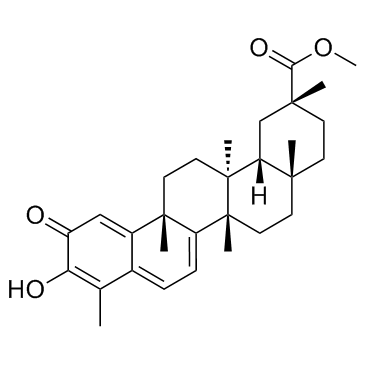Pristimerin induces caspase-dependent apoptosis in MDA-MB-231 cells via direct effects on mitochondria.
Chin-Chung Wu, Mei-Ling Chan, Wen-Ying Chen, Ching-Yi Tsai, Fang-Rong Chang, Yang-Chang Wu
文献索引:Mol. Cancer Ther. 4(8) , 1277-85, (2005)
全文:HTML全文
摘要
Pristimerin, a naturally occurring triterpenoid, has been shown to cause cytotoxicity in several cancer cell lines. However, the mechanism for the cytotoxic effect of pristimerin was never explored. In the present study, human breast cancer MDA-MB-231 cells treated with pristimerin (1 and 3 micromol/L) showed rapid induction of apoptosis, as indicated by caspase activation, DNA fragmentation, and morphologic changes. Pretreatment of a pan-caspase inhibitor benzyloxycarbonyl-Val-Ala-Asp-fluoromethyl ketone (z-VAD-fmk) completely prevented pristimerin-induced apoptosis. Treatment of tumor cells with pristimerin resulted in a rapid release of cytochrome c from mitochondria, which preceded caspase activation and the decrease of mitochondrial membrane potential. In addition, neither benzyloxycarbonyl-Val-Ala-Asp-fluoromethyl ketone nor permeability transition pore inhibitor cyclosporin A markedly prevented pristimerin-induced mitochondrial cytochrome c release. Pristimerin did not significantly alter the protein level of Bcl-2 family members (Bcl-2, Bcl-X(L), and Bax), nor did it induce Bax translocation. Moreover, Bcl-2 overexpression fails to prevent pristimerin-induced apoptosis. The generation of reactive oxygen species in MDA-MB-231 cells was also not affected by pristimerin. In a cell-free system, pristimerin induced cytochrome c release from isolated mitochondria. Taken together, these results suggested that pristimerin is a novel mitochondria-targeted compound and may be further evaluated as a chemotherapeutic agent for human cancer.
相关化合物
| 结构式 | 名称/CAS号 | 分子式 | 全部文献 |
|---|---|---|---|
 |
扁塑藤素
CAS:1258-84-0 |
C30H40O4 |
|
Pristimerin, a naturally occurring triterpenoid, protects ag...
2014-12-01 [Clin. Immunol. 155(2) , 220-30, (2014)] |
|
Targeting tumor proteasome with traditional Chinese medicine...
2010-03-01 [Curr. Drug Discov. Technol. 7(1) , 46-53, (2010)] |
|
Biomimetic synthesis of xuxuarines Ealpha and Ebeta: structu...
2008-02-15 [Bioorg. Med. Chem. 16(4) , 1884-9, (2008)] |
|
[In vitro activity of the pristinamycin against the isolated...
2003-09-01 [Pathol. Biol. 51(7) , 400-4, (2003)] |
|
Pristimerin inhibits breast cancer cell migration by up- reg...
2012-01-01 [Asian Pac. J. Cancer Prev. 13(4) , 1097-104, (2012)] |